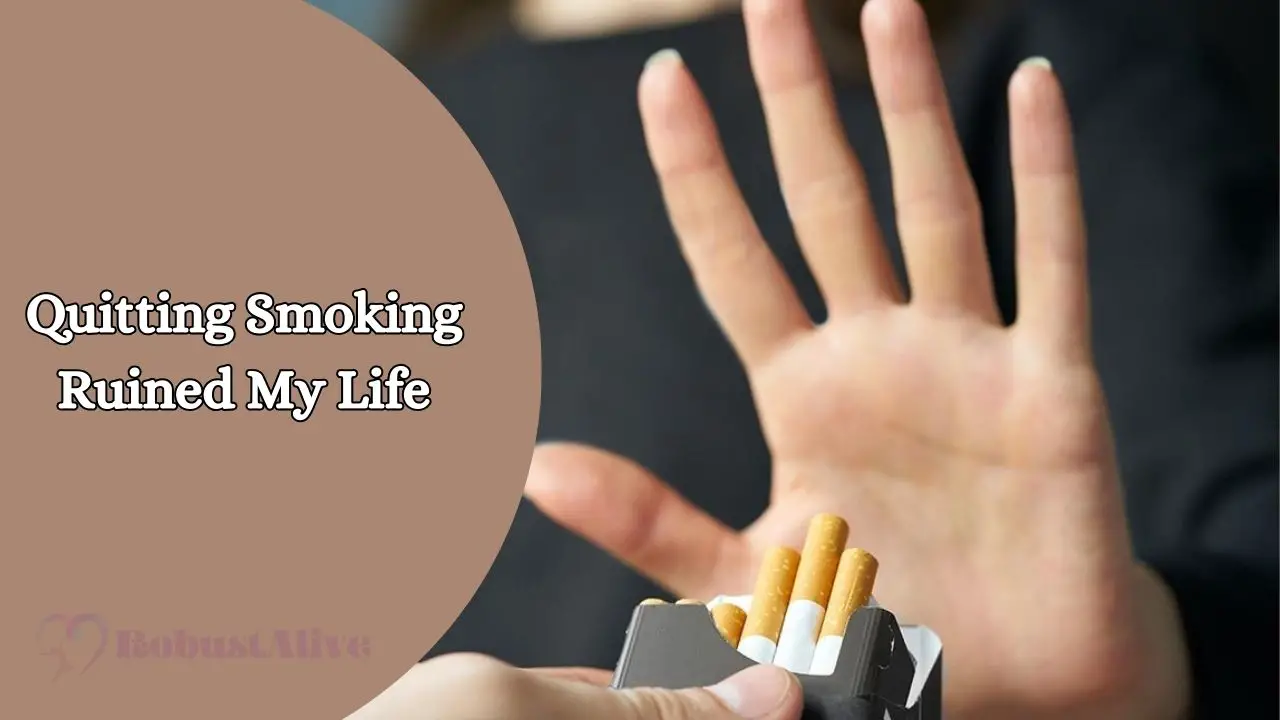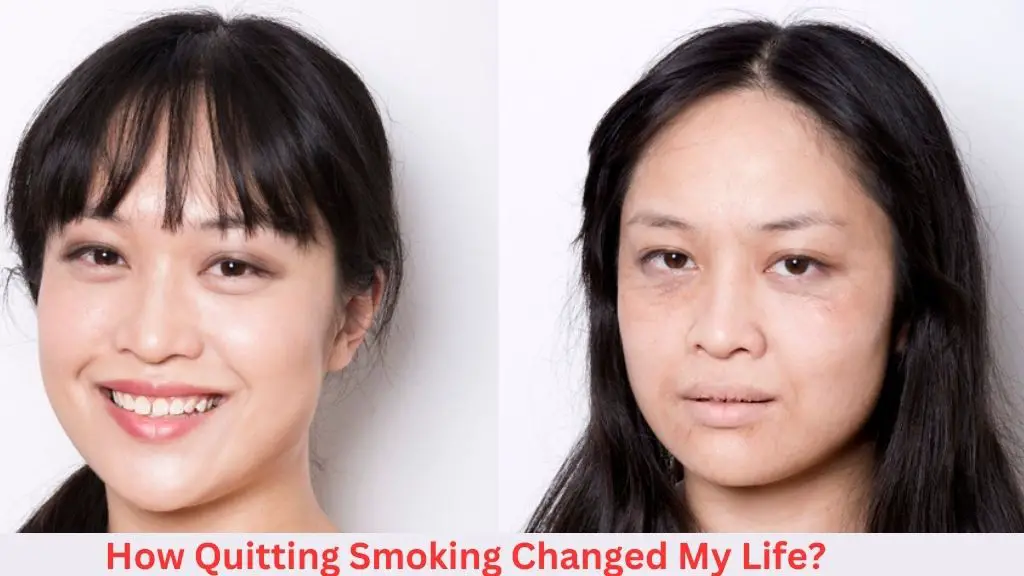Quitting Smoking Ruined My Life – A Story of A Real-Life Struggler Who Suffers A Lot

There is a myth: by cutting back on smoking entirely, feelings of anxiety and depression tend to disappear within the first week after abstinence begins. But in reality, is it that easy? Let me tell you, it’s the hardest task ever. And here you will learn how quitting smoking ruined my life.
In the beginning, it was challenging to restrain my urges or cravings for cigarettes, but the battle against my physical and mental health was indescribable. My constant companion became depressed. I had trouble falling asleep, and I constantly felt hungry. I ended up putting on too much weight. And my obesity has led to an outbreak of new diseases.
If you really want to kick out the habit of smoking, you must be aware of the things that I am going to share with you. Read on.
How Quitting Smoking Changed My Life?

About 7 years ago, I started smoking. It felt good to blow off steam. It helped a lot to get relief from anxiety. Surprisingly, it helped me get healed from depression at that time. It also enhanced my concentration initially and made me a chain smoker. However, thinking about all the hazardous cons of it, I quit it about 2–3 months ago. I quit it to get back to a normal, healthy life, but it results in unexpected abnormalities.
Now the question may pop into your mind about what happens when I quit smoking. So here is my hilarious story of quitting smoking.
I am a programmer by profession. Only a full-time programmer understands the level of attention required while programming. I couldn’t concentrate on my work once I stopped smoking. Due to a lack of concentration, I started to make major mistakes. My manager brushed me aside because I made mistakes every day. I feel like I’ve lost everything. I worked for the company for several years. My contribution was significant to its growth. To me, the company was no less than a baby. It was difficult for me to accept that I had lost my work. And all of this is just for stopping smoking! I was regretting not quitting smoking. At least, I did not lose my job. After the incident, I am depressed and have a lack of confidence.
My former anxiety and depression have returned with tenfold intensity. Nowadays, I get settled down by eating a lot of junk food. I started eating a lot also because of hunger. The man I see in the mirror today is no longer recognisable. I gained roughly 15 kg in the last several months. Due to obesity, health problems after quitting smoking are noticeable. I never thought that I would mess up everything in just a few months. This is the story of how smoking ruined my life. There are so many people out there who also suffered a lot after quitting smoking. Now I am going to share their stories too.
Nicole from New Orleans shares his quitting journey. He said that after withdrawing from nicotine, he had suffered from severe anxiety. And it lasted for 7-8 months. Due to anxiety, he faces shortness of breath, impending doom, and heart palpitations. Consequently, it leads to critical mental health issues. He said, I can’t relax, and I’m not able to sleep. I start to think about the past and future unnecessarily.
According to national cancer institute, people suffer from the following issues while withdrawing nicotine:
- urges to nicotine
- Anger, annoyance, and frustration
- inability to focus
- insomnia
- anxiety
- restlessness
- depression
- increased appetite or hunger
So, it’s clear that anxiety from quitting smoking can happen.
Smoking Causes Relationship Problems
We often hear about smoking causing relationship problems. 7 out of 10 people describe having issues with their smoking partner. 17% of non-smoker partners leave their smoker partner. But have you ever heard someone ruin their long-term relationship after quitting smoking? Surprisingly, this can happen.
Jonathan, a 28-year-old man, shared his own experience, saying that after quitting smoking, his relationship with his wife deteriorated. The reason was his throat irritation, under controlled anger, and less interest in getting intimate. He added that when someone tries to quit smoking, they will realise how hard it is to quit smoking. So, there is no doubt that quitting smoking creates issues in relationships.
How Does Your Personality Change After Quitting Smoking?
If you have already quit the habit of smoking, you may notice some changes in your personality. In general, you are not alone in this quitting journey that feels the same. It’s obvious that smoking has a bad impact on one’s life. You may notice certain modifications in your personality regarding smoking two times. One is when you begin smoking, and the other is when you stop.
As I said before, I had suffered from a lack of concentration and an extreme craving for food. Nicotine acts as a temporary stress reliever for some people. So quitting initially increases feelings of anxiety and stress as they cope without this coping mechanism. This is how people suffer from personality disorders due to kicking out nicotine.
The Popular NRT Makes My Life hell: Story of A Struggler
According to a study of NIH, people who take nicotine replacement therapy may suffer from the following issues:
- Headache
- Dizziness
- Heart palpitations and chest pain
- Nausea or vomiting
- Indigestion Gastrointestinal complaints
- Skin irritation
- Arthralgia
Jayden Grande, a 15-year-old boy, was trying to quit smoking. And with his family’s support, he started to take NR therapy. But his experience was hilarious. He shares that in the primary stage of taking NRT, he feels dizzy, and the constant headache makes him mad. The joint pain was severe. However, he overcame all the problems, but the experience was not so satisfying.
The Easy Way to Stop Smoking
You have to stick to some healthy methods to break this bad habit. These will help if you don’t want to ruin your life like other people have. The process will take a lot of time, but this is worth it as I am going to share the best way to quit smoking including some ideas that are suggested by cdc.gov. You can overcome the habit without experiencing any negative effects if you gradually stop doing it. So let’s begin.
Gradual Reduction: It is easier to quit by gradually reducing the number of cigarettes you smoke each day. This can help your body adjust to lower nicotine levels more gradually.
Nicotine Replacement Therapy: NRT products like nicotine gum, patches, lozenges, nazals, mouth sprays, or inhalers reduce withdrawal symptoms by providing a controlled dose of nicotine. Choosing the right NRT will help you get rid of these habits. E-cigarettes are also a good option as they create vapour like cigarettes, except with a harmful effect.
Prescription Medications: Medicines like bupropion, known as Zyban, and varenicline, known as Chantix, reduce nicotine cravings and withdrawal symptoms.
Counselling and Support: Behavioural therapy and counselling are extremely helpful in addressing the psychological aspects of smoking addiction. Support from a therapist or smoking cessation group provides strategies to cope with cravings and triggers.
Mindfulness and Stress Management: Techniques like meditation, deep breathing exercises, and yoga manage stress and anxiety, which are common withdrawal symptoms. These practises can also improve your mood and overall well-being.
Stay Active: Regular physical activity reduces cravings and improves your mood. It’s a healthy way to distract yourself from smoking urges and boost your overall health.
Healthy Diet: Eating a balanced diet and staying hydrated help manage weight gain that sometimes occurs when quitting smoking. Focus on nutritious foods and snacks to prevent excessive eating.
Avoid Triggers: Identify and avoid situations, places, or people that trigger your urge to smoke. Replace these triggers with healthier habits or activities.
Stay Busy: Engage in hobbies and activities that keep your mind occupied and away from thoughts of smoking.
Set a Quit Date: Choose a specific date to quit smoking, and prepare yourself mentally and emotionally. Having a clear goal makes the process more manageable.
Seek Support: Inform your friends and family about your decision to quit smoking and ask for their support. Having a strong support system makes a significant difference.
Positive Reinforcement: Reward yourself for reaching milestones in your quitting journey. Treat yourself to something you enjoy when you successfully resist smoking urges.
Can I Get Rid of Smoking Immediately?
Quitting smoking without side effects is challenging and hard to avoid immediately. Nicotine withdrawal causes various physical and psychological symptoms. However, the stop smoking tips will minimise these side effects and increase your chances of successfully quitting. And your body can repair itself after quitting smoking.
Another thing you can do is seek support from the NHS. NHS stop smoking services help you quit by their professional advisor. Notably, varenicline and bupropion are not available, but you can focus on the above-mentioned processes.
Frequently Asked Questions (FAQs)
What is the hardest week of quitting smoking cold turkey?
The difficulty of quitting smoking varies from person to person. Basically, there is no universally agreed upon “hardest week” because the challenges of quitting can be experienced differently by individuals. However, in general, the first few days and weeks after quitting is considered challenging.
Will I ever be normal after quitting smoking?
Perception is the master of the human body. Your body will adapt to any changes or situations as you train it up. Just being persistent, constant, and patient is all you need. Your senses of taste and smell will get better soon, after a week. You will experience less coughing and wheezing within three months. You will also notice an improvement in your immune system, circulation in your hands and feet, and the removal of mucus, tar, and dust from your lungs.
Conclusion
I hope it’s clear now how quitting smoking ruined my life. It’s essential to remember that everyone’s experience with quitting smoking is unique. Some side effects still occur, despite your efforts. But don’t be discouraged by setbacks, and consider seeking professional help if you find it challenging to quit on your own. Your physician can be a good motivator and advisor. He will definitely help you tailor a quitting plan to your specific needs. It can also help you manage any side effects that arise during the process.





